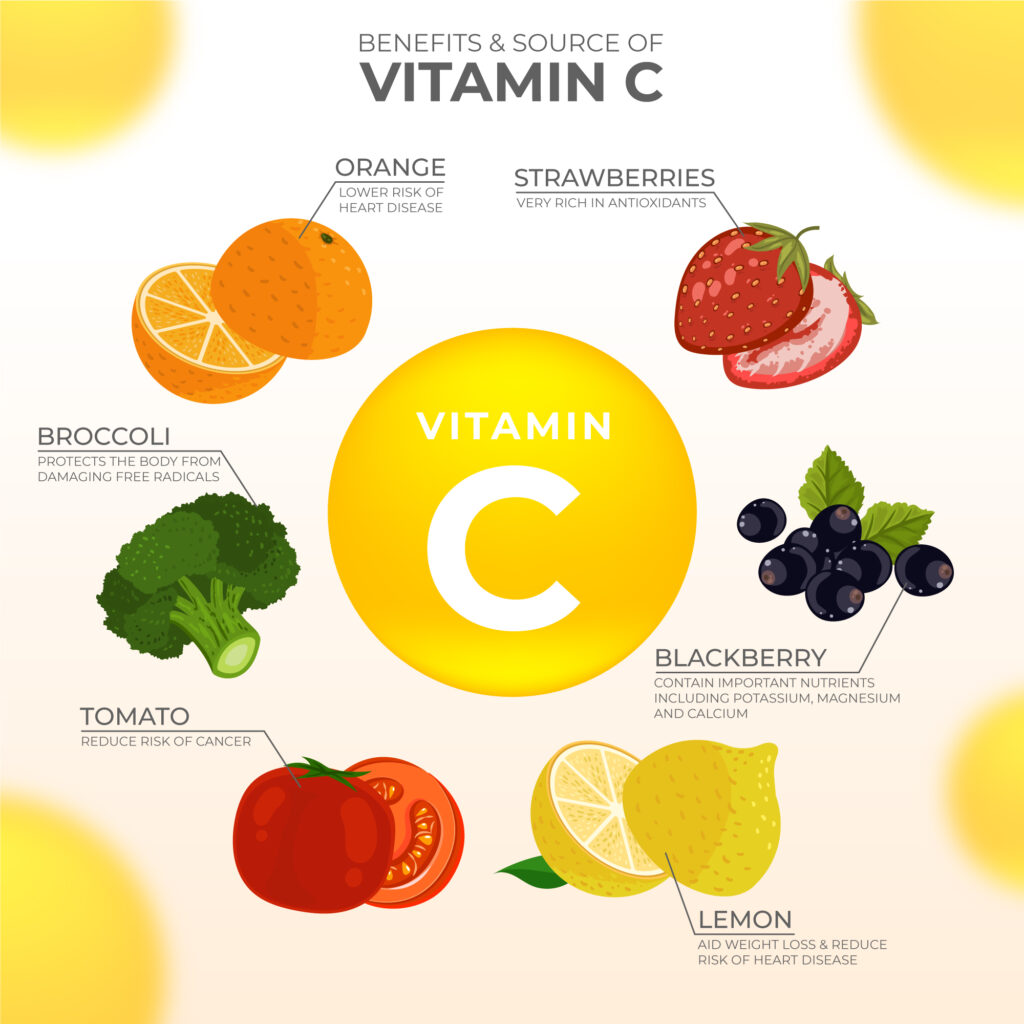
Overview
Vitamin C is one of the most essential nutrients required for our body to function optimally. Known scientifically as ascorbic acid, this powerful antioxidant plays a crucial role in maintaining overall health. Despite its importance, the body does not produce or store vitamin C, making it essential to include vitamin C-rich foods in your daily diet. In this blog, we’ll dive into the significance of vitamin C, its health benefits, and the top foods to incorporate into your meals to ensure you’re getting the right amount of this vital nutrient.
Why is Vitamin C Important?
Vitamin C is necessary for various bodily functions, including:
- Boosting the Immune System: It strengthens the body’s natural defenses against illness and infection.
- Collagen Production: Vitamin C is critical for the synthesis of collagen, a protein that helps maintain healthy skin, cartilage, bones, and blood vessels.
- Wound Healing: Collagen production supported by vitamin C plays a vital role in tissue repair.
- Antioxidant Function: As an antioxidant, vitamin C helps neutralize free radicals, which can damage cells and contribute to aging and disease.
- Iron Absorption: Vitamin C enhances the absorption of non-heme iron (plant-based iron), which is important for preventing iron-deficiency anemia.
A deficiency in vitamin C can lead to several health problems, including scurvy, a condition characterized by fatigue, swollen gums, joint pain, and skin problems. To prevent such conditions and maintain optimal health, it’s important to consume enough vitamin C daily.
Recommended Daily Intake of Vitamin C
The recommended daily intake (RDI) for vitamin C varies depending on age, gender, and other factors like pregnancy or smoking. Here’s a general breakdown:
- Men: 90 mg per day
- Women: 75 mg per day
- Pregnant Women: 85 mg per day
- Breastfeeding Women: 120 mg per day
- Smokers: 35 mg more than the standard RDI, as smoking increases oxidative stress and depletes vitamin C levels in the body
Related: benefits of vitamin D for your health
Top Sources of Vitamin C
While citrus fruits like oranges are commonly associated with vitamin C, there are many other foods that are just as rich, if not richer, in this essential nutrient. Here are some of the best sources of vitamin C:
1. Chili Peppers
Green chili peppers are an exceptional source of vitamin C. One green chili pepper can provide 121% of the daily value (DV) for vitamin C, while red chili peppers offer 72%. Aside from their high vitamin C content, chili peppers contain capsaicin, which may support weight loss and relieve pain.
- Vitamin C Content: 242 mg per 100 grams (green chili pepper)
2. Guavas
This tropical fruit is incredibly rich in vitamin C, with just one guava delivering 138% of the daily value. Guavas are also packed with other nutrients like lycopene, which may help lower blood pressure and cholesterol levels.
- Vitamin C Content: 228 mg per 100 grams
3. Sweet Yellow Peppers
The vitamin C content in sweet peppers increases as they mature. Yellow peppers, in particular, provide a whopping 380% of the daily value of vitamin C. Studies have shown that higher intakes of vitamin C can help reduce the risk of cataract progression, making yellow peppers beneficial for eye health.
- Vitamin C Content: 342 mg per large pepper
4. Black Currants
Black currants are loaded with both vitamin C and anthocyanins, which are powerful antioxidants. These berries may help reduce oxidative damage that contributes to chronic diseases like heart disease, cancer, and neurodegenerative conditions.
- Vitamin C Content: 102 mg per half-cup (56 grams)
5. Kiwifruit
One medium-sized kiwifruit delivers about 117% of the daily value of vitamin C. In addition to vitamin C, kiwis provide fiber, potassium, and vitamin E, all of which contribute to better digestive health and improved heart function.
- Vitamin C Content: 71 mg per medium-sized kiwifruit
6. Papayas
Papayas are another excellent source of vitamin C, with one cup providing almost 98% of the daily value. This tropical fruit has been shown to support brain health, and its anti-inflammatory properties may also aid in reducing chronic conditions.
- Vitamin C Content: 88 mg per cup (145 grams)
7. Strawberries
Strawberries are delicious and nutrient-dense, with one cup supplying more than the daily recommended value of vitamin C. They are also high in antioxidants and have been linked to improved heart health and blood sugar regulation.
- Vitamin C Content: 97 mg per cup (152 grams)
8. Cruciferous Vegetables
Vegetables like broccoli, kale, and Brussels sprouts are excellent sources of vitamin C, in addition to other important nutrients. Broccoli, for example, provides 80 mg of vitamin C per cup. These vegetables are also rich in antioxidants that help reduce inflammation and lower the risk of chronic diseases.
- Vitamin C Content (Broccoli): 89 mg per cup (91 grams)
9. Red Bell Peppers
Red bell peppers contain significantly more vitamin C than green peppers. Just one medium red pepper provides more than 150% of the daily value. They are also rich in beta-carotene, which is beneficial for skin and eye health.
- Vitamin C Content: 152 mg per medium red bell pepper
10. Tomatoes
Tomatoes may not be the first food that comes to mind when thinking of vitamin C, but they still offer a decent amount. Cooking tomatoes can reduce their vitamin C content but enhances the availability of lycopene, an antioxidant that may lower the risk of certain cancers.
- Vitamin C Content: 23 mg per medium tomato
Health Benefits of Vitamin C
Incorporating foods rich in vitamin C into your diet can yield numerous health benefits, such as:
- Boosting Immune Function: Vitamin C is known to enhance the production and function of white blood cells, which play a key role in fighting infections.
- Promoting Skin Health: As an essential part of collagen production, vitamin C helps keep the skin firm, youthful, and resilient. It also protects the skin from oxidative damage caused by UV rays.
- Supporting Heart Health: Studies have shown that people who consume more vitamin C-rich foods have a lower risk of heart disease. Vitamin C helps lower blood pressure, reduce bad cholesterol (LDL), and prevent damage to the arteries.
- Improving Iron Absorption: Vitamin C boosts the absorption of non-heme iron, which is particularly important for vegetarians and vegans who rely on plant-based sources of iron.
- Enhancing Brain Function: Antioxidants, including vitamin C, protect the brain from oxidative stress, which may help prevent neurodegenerative diseases like Alzheimer’s.
The Takeaway
Related: The Benefits of Vitamin C
Vitamin C is a vital nutrient that plays a crucial role in maintaining your health. By consuming a wide variety of vitamin C-rich foods such as chili peppers, guavas, strawberries, and cruciferous vegetables, you can ensure that you meet your daily needs. The benefits of vitamin C are numerous, from supporting your immune system to promoting skin, heart, and brain health.
Incorporating these foods into your diet will not only help you reach your daily vitamin C intake but will also provide a range of other health benefits thanks to their rich antioxidant content. So, fill your plate with colorful fruits and vegetables, and enjoy the powerful benefits of vitamin C
FAQs About Vitamin C
How much vitamin C do I need daily?
The recommended daily intake (RDI) for vitamin C varies based on factors like age and gender. Generally, adult men need 90 mg per day, while women require 75 mg. Pregnant women need 85 mg, and breastfeeding women require 120 mg daily. Smokers should add an extra 35 mg to their daily intake due to increased oxidative stress.
What are the best natural sources of vitamin C?
Citrus fruits like oranges are well-known sources, but other foods like chili peppers, guavas, strawberries, and sweet yellow peppers offer even higher vitamin C content. Cruciferous vegetables like broccoli and Brussels sprouts are also great options.
Can I take too much vitamin C?
While vitamin C is water-soluble and excess amounts are generally excreted, very high doses (above 2,000 mg per day) can lead to side effects like digestive issues, including diarrhea and nausea. It’s best to stick to recommended amounts unless advised otherwise by a healthcare professional.
Does vitamin C help with colds and the immune system?
Yes, vitamin C plays an important role in supporting the immune system. While it may not prevent a cold entirely, regular intake of vitamin C has been shown to reduce the duration and severity of colds and other infections.











